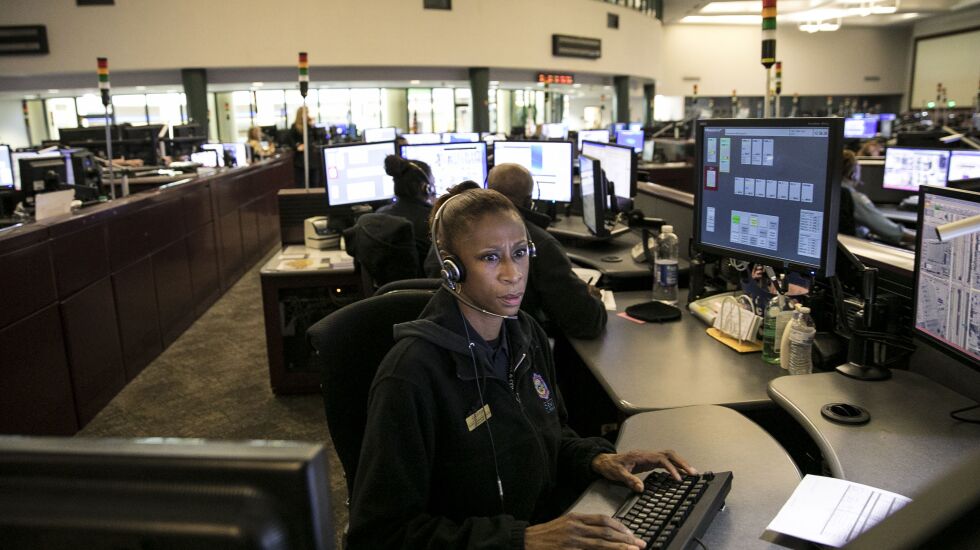
For evidence that the city’s 911 mental health responder teams are sorely needed, think back to the police shootings of Quintonio LeGrier and Bettie Jones on the day after Christmas in 2015.
LeGrier and Jones were shot and killed by an officer who was answering a 911 call from LeGrier’s father, who was reporting that his son — who had mental health problems and had previously called 911 for help himself — was threatening him.
The officer, Robert Rialmo, quickly shot and killed Quintonio when he saw him approaching with a baseball bat. A stray bullet struck Jones, a neighbor of the LeGrier family.
There’s no way to be sure what would have happened if a mental health professional, with training to deal with a person in crisis and de-escalate a tense situation, had been with Rialmo that night. Perhaps LeGrier and Jones would still be alive. Maybe Rialmo, who was later fired over the shooting, would still have his job. If Jones, a bystander, had not been killed, the city would not have had to pay a $16 million wrongful death settlement to her estate.
Those are all “what ifs?” But what’s not in question, in our view, is that the next mayor should keep pressing forward with Mayor Lori Lightfoot’s pilot program to send behavioral health teams to respond to 911 calls involving mental health concerns.
It’s a matter of better public health care and more effective policing — not politics.
More cities are now investing in these alternative response teams, experts say, and research supports the approach. Sending social workers or other clinicians to a 911 call that an addict is panhandling outside a coffee shop is a better way to help people in crisis and a better use of police resources.
“The vast majority of [911] calls have nothing to do with the kinds of things people think police should be responding to,” as Rebecca Neusteter, executive director of the University of Chicago Health Lab, told us. “There is great promise in responding differently.”
Expanding the scope
Chicago took its first step in that direction in 2021, when Lightfoot’s administration announced its pilot Crisis Assistance and Response Engagement, or CARE, teams — a mix of mental health professionals, paramedics and police trained in crisis response. They would answer some of the approximately 175 911 calls per day that involve behavioral health problems.
So far, the going has been slow. In part because of strict state protocols on 911 response, the CARE teams have responded to just two calls per day, as WBEZ’s Sharon Heffernan and Chip Mitchell reported recently. Those protocols are now loosening, and city officials expect the number of CARE team response calls to increase.
Now, for example, CARE teams can be sent to reports of trespassing, which typically have a low risk of violence and might involve, say, a homeless individual squatting in an abandoned building.
“That’s the kind of thing you want a social worker to go to,” as Jason Lerner, senior director of the 911 portfolio at the U. of C. Health Lab, told us.
A study from Stanford University on Denver’s alternative response program, which Lerner and Neusteter say is similar to Chicago’s, found substantial benefits.
Denver’s STAR — Support Team Assistance Response — teams were deployed to answer 911 calls or other police reports with a low risk of violence in eight downtown police precincts. Between June and December 2020, the teams handled nearly 750 incidents involving mental health, homelessness and/or substance abuse issues.
The researchers found that reports of less-serious crimes in STAR-patrolled neighborhoods fell by 34% when compared with crimes in other neighborhoods, likely because people were getting help and were thus less likely to commit new offenses.
The STAR program also saved money: The cost for the STAR team to respond to a single incident was, on average, about $151, substantially less than the estimated average of $646 per incident for a police response to a minor criminal offense.
Here in Chicago, the U. of C. Health Lab will evaluate the CARE teams. Their research, we hope, will point to ways to improve and expand the teams, which are now operating in just a handful of neighborhoods.
There are barriers to overcome before scaling up the pilot, including finding enough clinicians and training 911 operators to determine when a CARE team should be deployed. If police are to be part of the teams — which we think makes sense if there’s a higher risk of potential violence — those officers need crisis response training as well.
“There are concerns for safety and making sure this thing works, before blowing it up to be citywide and operating at a large scale,” Lerner told us.
That’s a big task — and it belongs on the next mayor’s agenda.
We welcome letters to the editor and op-eds. Check out our guidelines for both.







